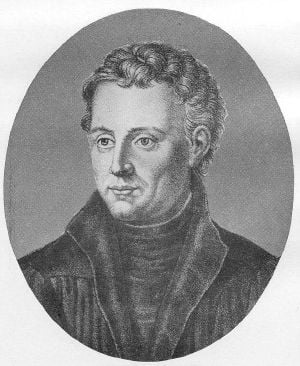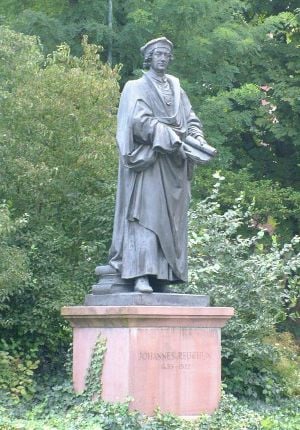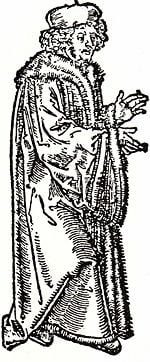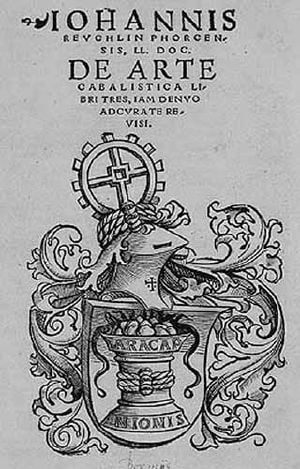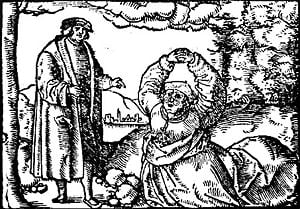Johann Reuchlin
Johann Reuchlin (January 29, 1455 - June 30 1522) was a German humanist and a pioneer scholar of Greek and Hebrew. For much of his life, he was the center of Greek and Hebrew teaching in Germany. He was eventually drawn into a major controversy over the suppression of Jewish books, winning lasting fame for his defense or religious toleration in the face of the Inquisition.
After learning Latin and Greek at the universities of Paris and Basel. Reuchlin served as an interpreter for Count Eberhard of Württemberg. He became fascinated by Jewish mysticism in 1490 after meeting Pico della Mirandola in Rome and later learned how to read Hebrew from Jakob ben Jehiel Loans, the Jewish physician of Emperor Frederick III.
While in the employ of various benefactors, Reuchlin published several important works and taught Greek and Hebrew privately to influential students. He became the first man in the Western world of his era to teach both the original languages of the Bible, as well as immersing himself in both Greek and Hebrew literature.
In 1510, Reuchlin was drawn into a bitter controversy with the Jewish-Dominican convert Johannes Pfefferkorn, who had convinced the emperor to confiscate and burn copies of the Talmud and other Jewish books. Asked for his opinion on the issue, Reuchlin urged the preservation of this literature and recommended the establishment of a chair of Hebrew in each of the major universities. As a result of his efforts, the order to destroy the Jewish books was rescinded. However, his enemies persisted, and Reuchlin had to face charges from the Inquisition. He was able to deflect the accusations for a time and returned to teaching before succumbing to illness in his late 60s.
Reuchlin is considered a hero in the history of European Judaism and is second only to Erasmus as a pioneer of Christian humanism.
Biography
Early life
Reuchlin was born at Pforzheim in the Black Forest, where his father was an official of the local Dominican monastery. According to the fashion of the time, his name was graecized by his Italian friends into Capnion, a nickname which Reuchlin used as a sort of transparent mask for himself in his work De Verbo Mirifico. He remained fond of his home town and frequently called himself "Phorcensis." In the De Verbo, he ascribed his interest in literature to his experience in Pforzheim.
Reuchlin began his Latin studies in the monastery school where his father worked. In 1470 he was for a short time enrolled in the University of Freiburg. His fine voice gained him a place in the household of Charles I, Margrave of Baden. There, due to his ability in Latin, he was chosen to accompany Frederick, the third son of the prince, to the University of Paris, where Frederick was destined for an ecclesiastical career.
At Paris, Reuchlin began to learn Greek, which had recently begun to be be taught at the university. He also attached himself to the leader of the Paris realists, Jean à Lapide (d. 1496), whom he followed to the new and energetic university of Basel in 1474. At Basel Reuchlin continued his studies in Greek under Andronicus Contoblacas. He also formed the acquaintance of the bookseller Johann Amerbach, for whom he prepared a Latin lexicon (Vocabularius Breviloquus, 1475-76), which ran through many editions.
He gained his master's degree in 1477, after which he began to lecture with considerable success, teaching a more classical Latin than was then common in German schools, and explaining Aristotle in Greek. Reuchlin's account of his teaching at Basel shows that by this time he had already found his life's work. He was a born teacher, although this work was not to be done mainly from the professor's chair.
Teacher and traveler
Reuchlin soon left Basel to seek further Greek training with George Hieronymus at Paris. He hoped to learn to write Greek well enough that he could support himself by copying manuscripts. For his long-term profession, however, his choice fell on law. He was thus led to the great school of Orléans (1478), and finally to Poitiers, where he became licentiate in July 1481. From Poitiers, Reuchlin went in December 1481 to Tübingen with the intention of becoming a teacher in the university. However, he accepted a temporary post as an interpreter for Count Eberhard of Württemberg, who was about to journey to Italy and required an interpreter.

Reuchlin thus left Stuttgart in February 1482 for Florence and Rome. The journey lasted only a few months, but it brought Reuchlin into contact with several learned Italians, especially in Florence. His connection with the count then became permanent, and he received important posts at Eberhard's court. About this time, Reuchlin appears to have married, but little is known of his married life, and he left no children. However, in later years his sister's grandson, Philipp Melanchthon, was like a son to him until the Reformation estranged them.
In 1490 he was again in Italy, where he encountered Pico della Mirandola, whose Christianized kabbalistic doctrines he inherited. He also made a friend of the pope's secretary, Jakob Questenberg, who would become an important ally to him in his later troubles. In 1492, he was employed on an embassy to Emperor Frederick III at Linz. Here he began to read Hebrew with the emperor's Jewish physician Jakob ben Jehiel Loans. This instruction laid the foundations of his knowledge of Hebrew.
By 1494, Reuchlin's rising reputation had been greatly enhanced by the publication of De Verbo Mirifico ("On the Miracle-Making Word"), an account of the supposed dialog between an Epicurean, a Jew, and a Christian, the latter being Reuchlin in his guise as "Capnion." In addition to enhancing Reuchlin's reputation, however, this work also aroused suspicion in conservative quarters due to its sympathetic treatment of humanistic ideas and Jewish mystical themes.
In 1496, Count Eberhard died, and enemies of Reuchlin had the ear of his successor. Reuchlin therefore quickly accepted the invitation of Johann von Dalberg (1445-1503), the scholarly bishop of Worms, to go to Heidelberg, where he was appointed to make translations from the classical Greek authors.
At Heidelberg, Reuchlin had many private pupils, among whom was the nobleman Franz von Sickingen, who later played an important role in the early Protestant Reformation. Although Reuchlin had no public office as a teacher, he became Germany's leading teacher of Greek and Hebrew—both the languages themselves and their classic texts, including the Bible. To carry out this work, he provided a series of aids for scholars. He created a Greek grammar for use with his pupils, and also published several small books on elementary Greek.
With the monks, however, he had never been liked, due to his appreciation of humanistic learning. At Stuttgart his great enemy had been the Augustinian Conrad Holzinger, upon whom he took a scholar's revenge in his first Latin comedy, Sergius, a satire on worthless monks and false relics.
Reuchlin soon came into contact with Philip, Count Palatine of the Rhine, who employed him to direct the studies of his sons. In 1498 he was sent by Philip on a mission to Rome, which enabled him to receive additional instruction in Hebrew and Judaism from Obadja Sforno of Cesena. Reuchlin returned from Rome laden with Hebrew books. He also learned that a change of government had opened the way for his return to Stuttgart, where his wife had remained all along. Around 1500, he was given a high judicial office in the Swabian League, which he held until 1512, when he retired to a small estate near Stuttgart.
Hebrew studies
Reuchlin's Hebrew studies had more than a mere philological interest for him. His De Arte Predicandi (1503) shows his interest in the use of Hebrew to improve Christian preaching, and he was particularly concerned that the Bible should be better known. Having studied both biblical Greek and Hebrew, he could no longer endorse the authority of the Vulgate Latin version which had become standard.
Reuchlin alos sought the true meaning of the Hebrew text of the Old Testament in the grammatical and exegetical tradition of the medieval rabbis, especially the thirteenth century rabbinical commentator David Kimhi. After carefully studying these traditions himself, Reuchlin resolved to open them to others. In 1506, he published his epoch-making De Rudimentis Hebraicis, a Hebrew grammar and lexicon based on the work Kimhi and other Jewish scholars. He later published an edition of the Penitential Psalms with grammatical explanations (1512).
Following Pico, Reuchlin took great interest in the Kabbalah, thinking it not only a profound theosophical tradition but also that it could be used both to bring Jews to Christianity and for the reconciliation of science and faith. Some of Reuchlin's kabbalistic notions had already found expression in the ideas of the De Verbo Mirifico. In 1517, however, his De Arte Cabbalistica addressed the topic more directly.
Dispute with Pfefferkorn
Reuchlin first became embroiled with his famous dispute with Johannes Pfefferkorn in 1510. A Jewish convert in the service of the Dominicans, Pfefferkorn advocated the seizure of key Jewish books such as the Talmud and the Zohar, as being anti-Christian and a stumbling blocks to Jewish conversion. Pfefferkorn's plans were backed by the influential Dominicans of Cologne, and in 1509, he obtained the emperor's authority to confiscate all Jewish books supposedly directed against the Christian faith. Armed with this mandate, he visited Stuttgart and demanded Reuchlin's help to execute the decree. Reuchlin evaded the demand, but he could not remain neutral.
After the Jews appealed the order, in 1510 Reuchlin was summoned in the name of the emperor to give his opinion on the issue of the suppression of the Jewish books. Reuchlin's report was favorable to the Jews. He divided the Jewish literature into various classes, arriving at the conclusion that the Talmud, the Zohar, and the commentaries of Rashi, Kimhi, Ibn Ezra, Gersonides, Nachmanides, and others should be preserved. He argued that these writings contained important historical information for Christians as well as Jews, and also that they were useful for theology and science. Moreover, he insisted that even if these writings contained views deemed blasphemous by Christians, the Jews could not be accused of heresy against Christianity, since they were under the protection of the German empire. He admitted, however, that books which contained direct attacks on the character and person of Jesus, such as the Toledot Yeshu, ought to be burned. Rather than destroying the great works of Jewish learning, Reuchlin proposed that the emperor should create two Hebrew chairs at every German university, for which the Jews should furnish books.
Largely as a result of Reuchlin's arguments, the emperor rescinded his edict of destruction on May 23, 1510. The Dominicans, however, did not take the defeat lying down. A prolonged conflict now ensued between Reuchlin and the Dominicans (and Pfefferkorn), into which the whole scientific world of Europe was drawn. The humanists sided with Reuchlin, while the clerical scholars, especially at the universities of Louvain, Cologne, Erfurt, Mayence, and Paris, took the part of the Dominicans. Pfefferkorn published his Handspiegel attacking Reuchlin in 1511, who answered it with his Augenspiegel in the same year.
The inquisitor Jakob von Hochstraten now took up the cry against Reuchlin, and in 1512, Augenspiegel was banned and confiscated. Reuchlin stated that he was willing to be corrected in theology, which was not his subject, but he could not unsay what he had said. With the Inquisition now mobilized, the universities all turned against Reuchlin, and by 1514, formal proceedings had begun against him at Mainz before the grand inquisitor. Reuchlin countered by appealing the question to Rome, where his earlier connections were put to good use. The matter was brought before the Lateran Council at its session of 1516, which decided in favor of Reuchlin. Although the decision was set aside, Reuchlin had been vindicated, and soon the intellectual world would be distracted by the advent of the Protestant Reformation.
Later years and death
While the controversy raged around him, Reuchlin continued his scholarly work, concentrating even more intensely on Hebrew studies. In addition to his work on the Psalms and the Kabbalah, he published a new Hebrew grammar, De Accentibus et Orthographia Hebræorum Libri Tres, in 1518, updating and correcting his previous efforts.
In 1519, Stuttgart was visited by famine, civil war and pestilence. From November of this year to the spring of 1521, Reuchlin sought refuge in Ingolstadt and taught there for a year as professor of Greek and Hebrew. In the meantime, in 1520, Pope Leo X condemned the Augenspiegel and ordered Reuchlin to keep "eternal silence," but the matter by now was of little consequence as the Reformation consumed the Church's energy. Reuchlin spent the winter of 1521-22 teaching at Tubingen. By the spring he was in bad health and died June 30, 1522.
Legacy
Johann Reuchlin was one of the great spirits of early Christian humanism, leaving in the history of the "new learning" a name second only to that of his younger contemporary Erasmus, whom he did not meet until 1514. Reuchlin's thirst for knowledge of the Bible and its original languages led him to a unique appreciation of Hebrew and Greek learning, including a fascination with Jewish mysticism. Indeed, he came to see Hebrew as the language in which God communicates to man through his angels.
Although not a controversialist by nature, it seems almost inevitable that, given his special appreciation for Hebrew language and rabbinical learning, a man of Rechlin's integrity would be drawn into a conflict with the dying obscurantist trend of Medieval philosophy and religion, which sought to protect "Truth" by destroying books it found objectionable. His stand against Pfefferkorn made him a hero not only to Jews, but also to all of those who stand for freedom of inquiry and religious liberty.
Among Reuchlin's pupils may be mentioned the Protestant reformers Philipp Melanchthon and John Oecolampadius, as well as the staunch defender of Catholicism, Johann Eck.
ReferencesISBN links support NWE through referral fees
- Bequette, John P. Christian Humanism: Creation, Redemption, and Reintegration. Lanham, MD: University Press of America, 2004. ISBN 9780761828075.
- Reuchlin, Johann. Recommendation Whether to Confiscate, Destroy, and Burn All Jewish Books: A Classic Treatise against Anti-Semitism. Stimulus series. New York: Paulist Press, 2000. ISBN 9780809139729.
- —. On the Art of the Kabbalah = De Arte Cabalistica. Janus series, 10. New York: Abaris Books, 1983. ISBN 9780913870563.
- Rummel, Erika. The Case Against Johann Reuchlin: Religious and Social Controversy in Sixteenth-Century Germany. Toronto, ON: University of Toronto Press, 2002. ISBN 9780802084842.
This article incorporates text from the Encyclopædia Britannica Eleventh Edition and the Jewish Encyclopedia, both publications now in the public domain.
Credits
New World Encyclopedia writers and editors rewrote and completed the Wikipedia article in accordance with New World Encyclopedia standards. This article abides by terms of the Creative Commons CC-by-sa 3.0 License (CC-by-sa), which may be used and disseminated with proper attribution. Credit is due under the terms of this license that can reference both the New World Encyclopedia contributors and the selfless volunteer contributors of the Wikimedia Foundation. To cite this article click here for a list of acceptable citing formats.The history of earlier contributions by wikipedians is accessible to researchers here:
The history of this article since it was imported to New World Encyclopedia:
Note: Some restrictions may apply to use of individual images which are separately licensed.
